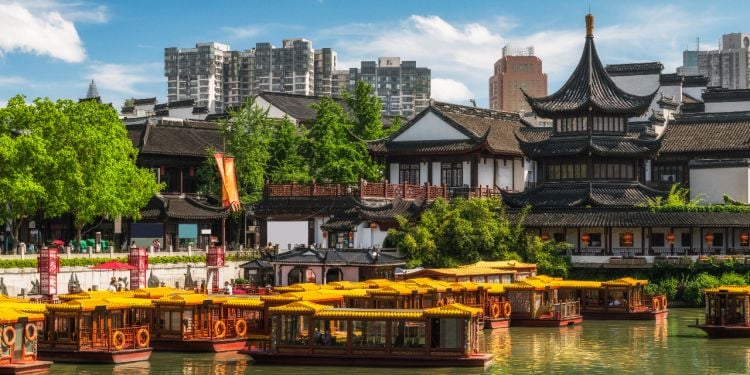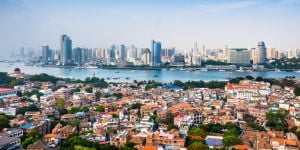
Even 600 years ago, Nanjing was a major center of culture and education in China. Today, the city is a major research and trading hub and home to some of China's best universities, like Southeast University. The city's rich history is engraved in its century-old city walls, temples, and mausoleums found in and around the city. With that, Nanjing is a fun modern city with a lot of educational and career opportunities to explore. Plus, a short high-speed rail trip away from Shanghai, it's a great destination to explore the rest of China from.
Why study in Nanjing?
Expats come to study in Nanjing for a variety of reasons. The city is considered to be one of China's 'most livable' cities thanks to its clean air and a generally favorable ecological situation. Nanjing is a small city by Chinese standards, with 'only' eight million people. Therefore, students can expect a more relaxed lifestyle than in the country's capital and other bigger university cities.
There is a multitude of green spaces in Nanjing, such as lakes, parks, and even small mountains. But best of all, early spring sees the International Plum Blossom Festival year after year, where the hills of Nanjing are transformed with subtle pinks and purples.
History enthusiasts will enjoy Nanjing a lot. You will have no shortage of places to visit: from the 600-year-old city wall to landmarks from the imperial era, such as Chaotian Palace or Linggu Temple. One of Nanjing's proudest sights is Zifeng Tower, also called Sun Yat-Sen Mausoleum. The Nanjing Massacre Memorial is also worth a visit, even though it tells a rather morbid history.
The academic environment in Nanjing
Nanjing has been a leading center for education for over 1,700 years. The city was the capital of various dynasties, the two most notable being the Southern Tang dynasty (AD 937'976) and the Ming dynasty (AD 1368 - 1644).
Today, Nanjing is home to a broad range of prestigious higher education institutions and research institutes as well as a diverse student population. Even though most of the programs are held in Mandarin, various universities are offering English-taught courses, like, for instance, Nanjing University.
Due to the lower tuition fees and cost of living compared to Beijing and Shanghai, Nanjing ranks 88th in the Affordability category in the Best Student Cities index. This makes the city a popular destination for international students.
Additionally, after the labor reforms in 2017, it has also become a lot easier for international students to secure a work visa after graduating from a Chinese university. This allows young foreign professionals to remain in China for work and further career development.
Which are the biggest universities in Nanjing?
There are a number of notable universities in Nanjing. The two most famous ones are Nanjing University and Southeast University.
Nanjing University (NJU)
Located in China's old capital of six dynasties, Nanjing University was established in 1902 and is one of the oldest and most prestigious schools in the country. It has also played a significant role in developing the modern Chinese educational system, as it was the first university to combine education and research in the country.
The university counts 28 schools on three campuses. According to the QS World University Rankings of 2019, NJU ranked 122nd overall in the list of universities worldwide.
The university counts a faculty body of over 2,400, including over 600 international staff members. Nanjing University hosts over 32,000 students and nearly 3,000 international students, 55% of whom are undergrads. The government heavily supports Nanjing University both under Project 211 (a program aimed at raising the research standards of high-level universities) and Project 985 (focusing on becoming a world-renowned university).
The average tuition fees at Nanjing University vary between RMB 19,000 to RMB 40,000 yuan per year.
Southeast University (SEU)
One of the national key universities administered directly under the Central Government and the Ministry of Education of China, SEU has three campuses across Nanjing. The QS University Ranking places Southeast University in 511th place among other universities worldwide.
The school welcomes more than 32,000 students, including more than 1,400 international students. Moreover, there are over 2,700 faculty members with 168 international staff leading 64 undergraduate programs, 206 master's programs, 109 doctoral programs, as well as 15 postdoctoral research sites.
You will need from RMB 16,000 to RMB 32,000 yuan per year to study at Southeast University.
How to apply for a student visa to China?
To apply for a student visa to China, you can submit your visa application together with the supporting documents at the Chinese VISA Application Service Centre or the Chinese Consulate or Embassy in your home country.
First, make sure that the education establishment you are applying to has the right to offer courses for foreign nationals. If your application is successful, the establishment will send you an admission letter and a JW201 or JW202 form to complete. Keep these documents as you will need to submit them together with your application at the Embassy. You will also need to present the following supporting documents:
- Original passport valid for at least six months;
- passport-size photograph;
- copy of the acceptance letter (together with the original);
- proof of legal status in the country you are applying from; and
- evidence of your flights and arranged accommodation.
For post-graduate education programs, you will also be asked to present photocopies of your diplomas and academic transcripts translated into Chinese.
Once your visa is approved, you will need to take a series of medical examinations. Depending on the educational establishment you plan to study at, you may be asked to do a medical check in your home country or upon arrival in China. It is usually recommended to do the medical examination once you arrive in China to make sure it's completed in the right format. Moreover, some universities may arrange for groups of students to go through the check together. Your medical certificate is valid for six months.
Those with an X1 Visa will need to apply for a Temporary Residence Permit within 30 days of arriving in China. The permit is typically issued for a minimum period of 6 months and a maximum of 5 years.
Important:
You are not allowed to work on a student visa. Internship options may be available (check with your school/university), as well as volunteering.
The list of required documents may vary depending on your country of residence and the study program you are applying for. Contact your Chinese Embassy for an updated list of documents needed before the appointment.
Study culture in Nanjing
The first thing you may notice about the study culture in Nanjing is that it is quite hierarchical. Students are generally required to formally address the teachers using 'professor' or “laoshi” in Mandarin. Depending on the major and type of school you are studying at, you will either be part of a fixed group of students with the same schedule or attend your classes individually for each lecture. Professors hold exams and sometimes projects to calculate the grades. The number of projects and exams can vary depending on the professor.
Attendance is a crucial factor in both your academic success and the ability to keep your student visa. Be aware that Chinese universities are required to submit attendance records of international students to the Bureau of Immigration. If your attendance is below what's required for a student visa, your visa may be canceled, or you may find yourself unable to renew it.
Some Chinese universities offer tuition in English. However, if you wish to take multidisciplinary courses in Chinese, you must pass the international test of Mandarin, also known as HSK. Sessions of examination for the HSK are held both in China and in many different countries. For HSK examination dates in your area, please refer to the Chinese Consulate or Embassy in your country.
Scholarship schemes are available to international students in China. Please contact your home university, the embassy or consulate of China, or the China Scholarship Council (CSC) to find out more information about government-sponsored programs and scholarships available.
Student life in Nanjing
There is a saying that says that Beijing is a city of politics, Shanghai is a city of commerce and Nanjing is a city of China. Nanjing is China's ancient capital –– the city's name actually translates to southern capital. It's one of the few big cities in China that has retained a substantial part of its original architecture: here, you will find ancient city walls and a group of very well-preserved national parks.
Nanjing is the capital of Jiangsu province, one of the leading provinces in China when it comes to foreign investment. This means that there are a number of international companies in Nanjing as well as a lot of local companies working with the foreign market. So, if you are looking to explore job opportunities upon graduation, you will have options. Plus, Nanjing is located just about 300 kilometers west of Shanghai — which makes it a great spot to experience work opportunities and entertainment in Shanghai without committing to high living costs.
Nanjing has a smaller expat community compared to Shanghai, Beijing, or Guangzhou. However, it's a great place if you are looking for a more “real China” experience and a large convenient city with an affordable cost of living.
International students in Nanjing also have a lot of choices when it comes to after-school activities. They can explore all the varieties of Chinese cuisine, learn about the country's culture, and travel to other parts of China. No matter where in China you are settled, traveling around the country is easy and convenient — with cheap flights and a well-developed high-speed railway network.
Campus life in China can also be rich and fulfilling. There are lots of activities that are popular with Chinese students, like table tennis, karaoke, tai chi and others. Practically all universities offer fully equipped facilities for sports and other after-class activities.
Study Chinese in Nanjing
If you are not ready to commit to a full-time study program in China, consider taking up a Chinese language course in Nanjing. If you are interested in exploring China and learning more about the country, signing up for a Chinese course may be a great way to do that. Some universities and a lot of training centers in Nanjing offer specialized courses for learning Chinese. This can be a great way to explore the country and its culture, network with fellow students from around the world, and discover job opportunities in Nanjing and beyond. Speaking Chinese can be a substantial advantage when job hunting and may open a lot of doors if you are considering a career in China.
Useful links:
We do our best to provide accurate and up to date information. However, if you have noticed any inaccuracies in this article, please let us know in the comments section below.












Comments